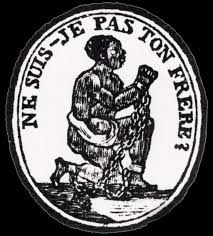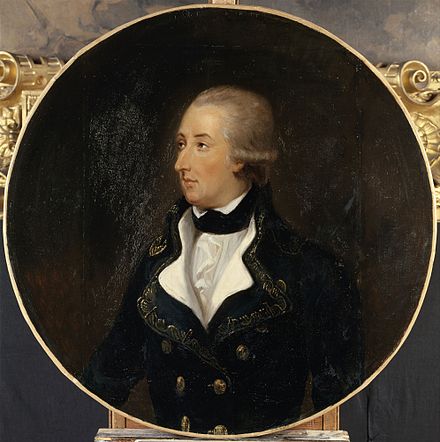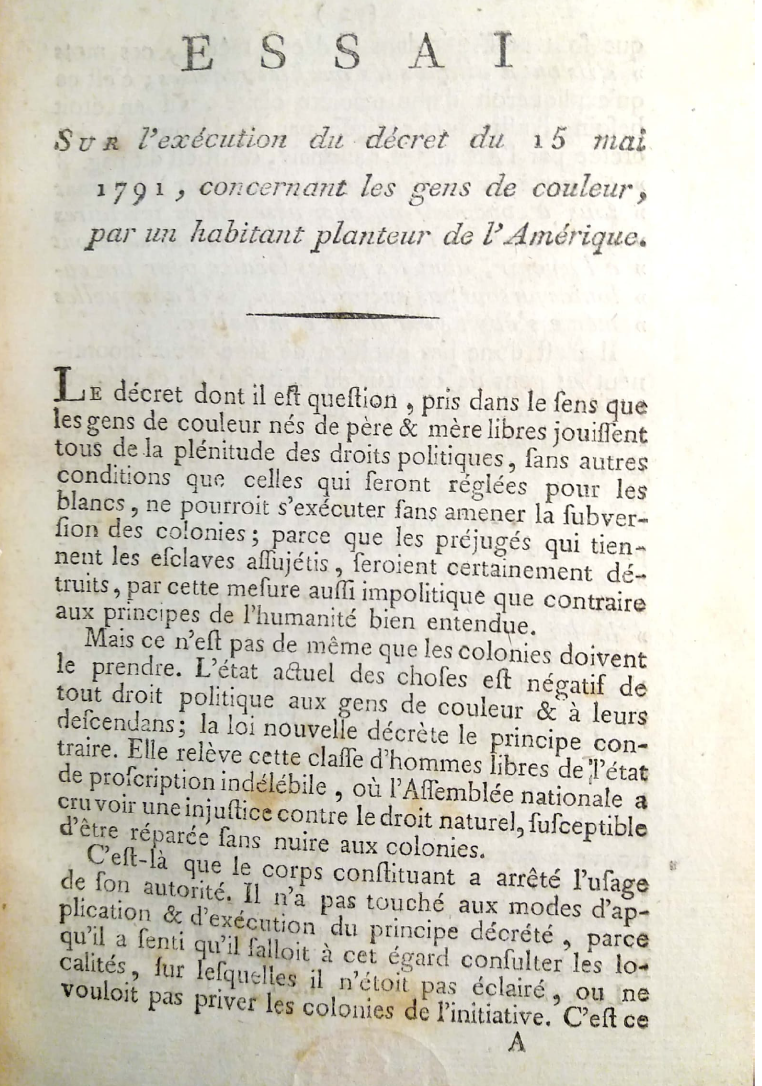Three arguments from white colons against granting people of colour the rights of active citizenship8/15/2018 Although the Club des Amis des Noirs wanted the abolition of slavery, the question that was debated in the National Assembly in 1791 was whether free people of colour should be granted active citizenship. In 1791 white colons proposed to the National Assembly that a distinction should be established in the colonies between free people of colour and white people, introducing several classes drawn in accordance to degree of black ancestry, which was assumed to be correlated with appearance of whiteness. An edict of 1685 granted any person who had been freed from slavery the same rights as those subjects who had never been slaves in the first place. Therefore, to introduce a distinction in 1791 would be to go back on this edict. Free people of colour were people born of a free mother and father, and had at least one black ancestor. Active citizenship meant the right to vote. The proposed distinction would have given free people of colour civil rights, but not political ones. The arguments presented by white colons against granted free people of colour full rights of citizenship were of course appalling, both in their logic and their content. Here are a few examples: 1) From:Motifs de la motion faite a l’Assemblée nationale le 4 mars 1791, par M. Arthur-Dillon, Depute de la Martinique. Arthur-Dillon (1750-1794) was an English born aristocrat who inherited leadership of French regiment. Fought for American and French revolutions. Having sailed to Caribbean he met and married Louise de Girardin de Montgerald, Comtesse de la Touche. The couple had six children. Arthur-Dillon eventually came back to Paris as depute of Martinique. In a speech for the National Assembly he writes about the dangers of the opinions of the Club des Amis des Noirs. “They have no knowledge of the place and want to destroy at once political ties that only time and a long period of calm could weaken. Allowing men of colour to be represented at the Assembly would result in an immediate insurrection of the colonies against France.” This argument: ‘you don’t know what it’s like there’ was one most commonly used by white colons. 2) From: Essai sur l’execution du decret du 15 mai 1791, concernant les gens de couleur par un habitant planteur de l’Amerique. The anonymous planter argues that the decree that PoC born of free mothers and fathers should enjoy civil and political rights “will bring about the subversion of the colonies because the prejudices which keep slaves in bondage will be certainly destroyed by this act as politically flawed as it is contrary to the principles of humanity properly understood.” He goes on to explain: “The prejudices of slaves are precious; we must preserve them carefully. We can even say that each time we touch them, we will accelerate the subversion of the colonies in proportion to the gravity of the attempt against them”. And again: “They believe themselves to be bound to servitude because they are black and because they came, or their parents did from a foreign land where slavery exists. Thinking of themselves as men, as it were, or a different species, they are become familiar with the superiority of the white, in whom they see benefactors who free slaves and better the lives of those who are not white. Last, their state, made sweeter by habit, is only bitter for a few markedly bad individuals”. He also notes, more sensibly, perhaps, if only because this is an argument that can be engaged with: “There is nothing as dangerous as an excessive population of free men in a country where only slaves cultivate the earth, and which is fed mostly form outside, and whose near totality of production is not edible.” This argument was often cited, not only by colons, but by the abolitionists who recognized that this was an economic consideration worth taking into account. Olympe de Gouges responded that freed slaves would be more willing to cultivate the earth once they had a stake in it. 3) From: Réponse d’un ami des Noirs a la lettre de M.***, habitant de Saint Domingue. Paris, 16 Novembre 1791.
The author blames revolts in Saint Domingue (Haiti) on the Club des Amis des Noirs, and specific members he refers to only by their initial. He claims that the true friends of black people are ‘all men who are just and humane, all planters who work to sweeten, through their goodness, the necessary dependence of the laborious and faithful negro, and only punish the guilty negro regretfully.’ He goes on to make a most counter-revolutionary analogy: "It is possible to love the Blacks like the French love the people, who, because they have more passions than lights, think they serve the cause of liberty and equality when it only defiles itself with crime and precipitates its fall into an abyss of misery, and is nothing but the instrument of the fanatics and the factions.” The view that black people are not to be seen as human in the same way as white people are was actually shared by the National Assembly in 1791, who granted the colons that black people were like children, in a state of prolonged minority, and that the state ought to act towards them as a parent, making decisions on their behalf. (Projet d’instruction pour les colonies relativement aux Decrets des 12 et 15 )
0 Comments
Leave a Reply. |
About
This is where I live blog about my new book project, an intellectual biography of three French Revolutionary women philosophers. Categories
All
Archives
November 2022
|



 RSS Feed
RSS Feed